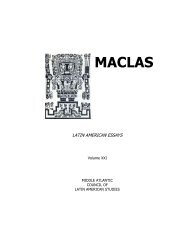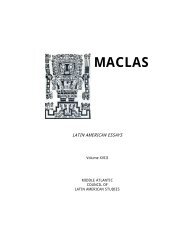latin american essays maclas
latin american essays maclas
latin american essays maclas
You also want an ePaper? Increase the reach of your titles
YUMPU automatically turns print PDFs into web optimized ePapers that Google loves.
and Psychological School of Law is the previously mentioned Juan Bautista<br />
Alberdi. However, while Alberdi applies it to explain the development of the<br />
Argentine domestic legal system, Álvarez uses it to explain and justify the<br />
development of a hemispheric-wide American International Law. Although<br />
Alberdi and Álvarez share this school of legal philosophy, their views on American<br />
International Law are not identical. They both see American International Law<br />
as the set of legal principles contributed by all the American republics to foster<br />
the development of global international law. They both agree that American<br />
International Law should not weaken universal law and justice. Yet, here the<br />
similarities end. Alberdi, concerned with the possible development of a double<br />
standard of justice, sees American regional legal principles as new contributions<br />
to global international law, but not as a distinct regional legal system.<br />
Alternatively, Álvarez believes that American legal principles will both contribute<br />
to the development of global law and constitute a permanent, independent<br />
regional legal system.<br />
Subscribing to the Social and Psychological School of Law and to its<br />
fundamental beliefs that law emerges from society and that there is neither a<br />
society without law nor a legal system without a social basis, Álvarez maintains<br />
that there is both an American continental society (including the United States<br />
and all of the countries of Latin America and the Caribbean) and an American<br />
International Law. For Álvarez, the shared formative experience of all the<br />
American republics as they struggled for independence and diplomatic<br />
recognition, their geographical unity and separation from Europe, and their<br />
unique characteristics and problems created an American continental society.<br />
This continental society, in turn, laid the foundation for the emergence of several<br />
novel legal principles, such as the right of independence during emancipation<br />
and the principles of non-intervention and sovereign equality during the struggle<br />
for recognition and acceptance in the community of nations. Together, these<br />
principles constitute a new body of hemispheric law that Álvarez calls American<br />
International Law. Accordingly, he defines American International Law as the<br />
regional international legal system formed by the set of institutions, norms, rules,<br />
doctrines, agreements, customs, and practices that are peculiar to the New<br />
World. 10<br />
Álvarez believes that the characteristic of universality often attributed to<br />
international law is actually neither attainable nor desirable. For him, "... the<br />
solidarity of nations does not consist in their being guided always by the same<br />
principles but rather … [in their being guided] by well-defined principles which<br />
take into account the peculiar conditions of certain groups of states so that the<br />
latter may develop in harmony with their special needs" (1909, 216).<br />
Accordingly, since all international legal principles are not universal, there is<br />
room for regional legal systems, such as American International Law. In this<br />
context, American International Law does not seek to perpetuate any<br />
35




